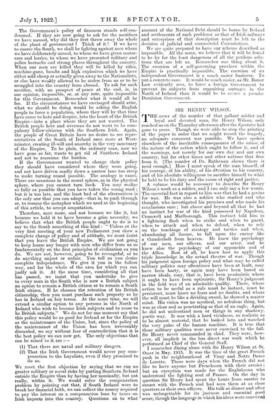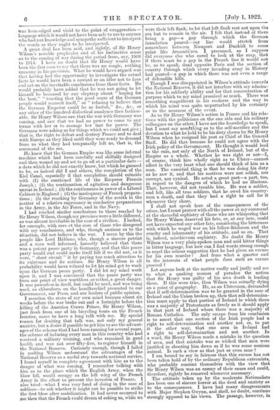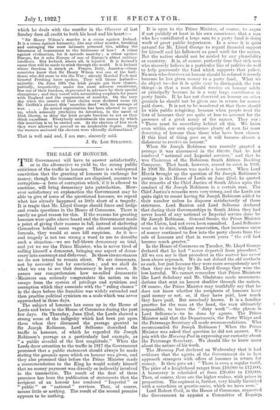SIR HENRY WILSON. T HE news of the murder of that
gallant soldier and loyal and devoted man, Sir Henry Wilson, only reached us on the Thursday afternoon after the Spectator had gone to press. Though we were able to stop the printing of the paper in order that we might record the tragedy, no adequate comment was possible. We have spoken elsewhere of the inevitable consequences of the crime, of the nature of the action which ought to follow it, and of the warnings, not merely for our own day and our own country, but for other times and other nations that flow from it. [The murder of Dr. Rathenau shows there is need enough.] Here I must speak of the man himself, of his courage, of his ability, of his devotion to his country, and of his absolute willingness to sacrifice himself to what he held to be his duty and the cause of right and justice.
A volume would be necessary to describe Sir Henry Wilson's work as a soldier, and I can only say a few words. The essential fact in regard to him was that he had a genius for war. He was also a soldier who studied and who thought, who investigated his premises and who made his conclusions sure ; but above and beyond all that he had an instinct for war of the kind possessed by Napoleon, Cromwell and Marlborough. This instinct told him in a lightning flash when to strike and when to guard, when to attack and when to defend, when to rely on the teachings of strategy and tactics and when, abandoning all finesse, to fall upon the enemy like a thunderbolt from heaven. He knew the psychology of our men, our officers, and our army, and he knew also the psychology of our opponents and of the Allies. Best of all, he knew how to apply this triple knowledge in the actual theatre of war. Though his judgment upon foreign policy and what may be called military politics may oftentimes have been at fault, may have been hasty, or again may have been based on narrow ideals, may, that is, have been pessimistic where it ought to have been optimistic, Sir Henry's judgment in the field was of an admirable quality. There, where action to be useful as a rule must be instant, must be persistent, must know no fears and no doubts, and where the will must be like a dividing sword, he showed a master mind. His vision was no mystical, no nebulous thing, but was as clear and as penetrating as that of an eagle. Again, he did not understand men or things in any shadowy, poetic way. It was with a hard vividness, so realistic as to be almost material, that he looked into and watched the very pulse of the human machine. It is true that these military qualities were never exercised to the full. Sir Henry never commanded in chief. They were, how- ever, all implicit in the less direct war work which he performed as Chief of the General Staff. I remember dining alone with Sir Henry Wilson at St. Omer in May, 1915. It was the time of the great French push in the neighbourhood of Vimy and Notre Dame de Lorette. Those were days when the French did not like to have anyone but Frenchmen with their armies ; but an exception was made for the Englishman who understood the fighting soul of France. On the day in question Sir Henry had spent the hours from sunrise to sunset with the French and had seen them at as close quarters as their own officers. His talk at dinner and after was unforgettable for its justness and essential good sense, though the language in which his ideas were conveyed was keen-edged and vivid to the point of exaggeration— language which it would not have been safe to use to anyone who had not knowledge and sympathy sufficient to interpret the words as they ought to be interpreted. A great deal has been said, and rightly, of Sir Henry Wilson's notable prophecies and of his instinctive sense as to the coming of war during the period from, say, 1909 to 1914. I have no doubt that Sir Henry would have been the first man to say that there was no magic, nothing uncanny in his prevision. What he would have argued was that having had the opportunity to investigate the actual facts he would have been a coward or an idler not to face and act on the inevitable conclusions from those facts. He would probably have added that ho was not going to let himself be bemused by any claptrap about " hoping for the best," " trusting that the good sense of the German people would reassert itself," or " refusing to believe that the German Emperor could be so foolish," &c., &c., or any other of the hundred dialectical anodynes then fashion- able. Sir Henry Wilson saw that the war with Germany was coming, and saw that we had no power to come to any terms with her or to assuage her lust for power. The Germans were asking us for things which we could not give ; that is, the right to defeat and destroy France and to deal with Europe as they liked until they were ready to demand from us what they had temporarily left us, that is, the command of the sea.
He knew that the German Empire was like some infernal machine which had been carefully and skilfully designed and then wound up and set to go off at a particular date— a date which he did not exactly know, but which he guessed to be, as indeed did I and others, the completion of the Kiel Canal, especially if that completion should coincide with (1) the continued life of the Emperor Francis Joseph ; (2) the continuation of agitation and dangerous unrest in Ireland ; (3) the continuance in power of a Liberal Cabinet in England ; (4) the inadequacy of French prepara- tions ; (5) the reaching by Germany of the zenith in the matter of a relative supremacy in combative preparations in the Army, in the Air Force, and in the Navy.
I had reached similar conclusions to those reached by Sir Henry Wilson, though my premises were a little different, as was almost inevitable in the case of a civilian. I looked, for example, with care at the case of those who disagreed with my conclusions, and who, though anxious as to the situation, did not believe in the war. I mean by this the people like Lord Haldane, who, though a sincere patriot and a man well informed, honestly believed that there was a potent peace party in Germany, and that this peace party would and could make itself felt if we did not, as it were, " short circuit " it by paying too much attention to its existence and its actions. Sir Henry Wilson in all probability would have refused to let his mind get to work upon the German peace party. I did let my mind work upon it, and I was convinced that the peace party was from our point of view worthless„or rather, a great danger. It was powerless in itself, but could be used, and was being used, as chloroform on the handkerchief presented to our Government, our Press, and our leaders of public opinion.
I mention the state of my own mind because about six weeks before the war broke out and a fortnight before the killing of the Austrian Crown Prince, Sir Henry Wilson, just fresh from one of his bicycling tours on the French frontier, came to have a long talk with me. My special reason for desiring that talk was, not only my general anxiety, but a desire if possible to get him to see the advant- ages of the scheme that I had been running for several years, the scheme of inducing every man in this country who had received a military training, and who remained in good health and was not over fifty-five, to register himself in the National Reserve. Curiously enough, though I failed in making Wilson understand the advantages of the National Reserve as a useful step towards national service, I found myself in complete agreement with him as to the danger of what was coming. I remember talking with him as to the place which the English Army, when the blow fell, would occupy as the left wing of the French Army in the effort to prevent the invasion of France. I also tried—what I was very fond of doing in the case of soldiers—to ask whether it might not be possible to strike the first blow after mobilization. It had never occurred to • pie then that the French could dream of asking us, while we were their left flank, to let that left flank rest not upon the sea but to remain in the air. I felt that instead of there being a gap—a gap through which the German inundation poured—our line would stretch from somewhere between Nieuport and Dunkirk to some point like Armentieres. I presumed, as I suppose did everyone else who cared to look at the map, that if there must be a gap in the French line it would not be, so to speak, dead opposite Paris and the section of country through which every invading army in History had poured—a gap in which there was not even a range of defensible hills.
Though I was disappointed in Wilson's attitude towards the National Reserve, it did not interfere with my admira- tion for his soldierly ability and for that concentration of purpose which to my mind promised so much. There was something magnificent in his coolness and the way in which his mind was quite unperturbed by his certainty as to the nearness of the event.
As to Sir Henry Wilson's action in France and his rela- tions with the politicians on the one side and his military colleagues on the other, I have not the knowledge to speak, but I must say something as to the self-sacrifice and the devotion to what he held to be his duty shown by Sir Henry Wilson when he resigned his post as Chief of the General Staff. He did that because he could not agree with the Irish policy of the Government. He thought it would lead to the ruin, not only of the North of Ireland, but of the Empire as a whole. Whether he was right or not—I, of course, think him wholly right as to Ulster—cannot affect in the very least what one should think of him as a man. The essential thing is that he was doing his duty as he saw it, and that his motives were not selfish, nor corrupt, nor cynical. He acted a great part—a part, too, in regard to the dangers of which he had no illusions. That, however, did not trouble him. He was a soldier, and felt, like all true soldiers, that he owed his country- men a death, and that they had a right to call for it whenever they chose. I shall not speak here of the consequences of the crime, but I must protest with all the power at my command at the shameful sophistry of those who are whispering that Sir Henry Wilson deserved his fate, or, at any rate, could not have expected any other fate, considering the bitterness with which he waged war on his fellow-Irishmen and the cruelty and inhumanity of his attitude, and so on. 'That is, indeed, mischievous sophistry. No doubt Sir Henry Wilson was a very plain-spoken man and said bitter things in bitter language, but how can I find words strong enough to repel the odious suggestion that he had given an excuse for his own murder ? And from what a quarter and in the interests of what people does such an excuse proceed ? Let anyone look at the matter coolly and justly and see to what a quaking morass of paradox the notion that Sir Henry was guilty of his own death is leading them. If this were true, then Wilson was actually dying on a point of geography. He, as an Ulsterman, demanded that if self-determination was to be granted .in the case of Ireland and the Union broken up, then that self-determina- tion must apply to that portion of Ireland in which there was a majority of Protestants as firmly as it should apply in that part of Ireland where there was a majority of Roman Catholics. The only escape from his conclusion is to assert that one section of the Irish people had a right to self-determination and another not, or, to put it the other way, that one area in Ireland had a right to self-determination and not another. In a word, Sir Henry Wilson made a mistake in the question of area, and that mistake was so wicked that men were justified in shooting him down as if he was some noxious animal. Is such a view as that just or even sane ?
I am bound to say in fairness that this excuse has not been taken hold of by the ordinary Republican extremists, who probably content themselves with the view that Sir Henry Wilson was an enemy of their cause and could, therefore, rightly be removed whenever necessary.
The attitude taken up by the moderate Nationalists has been one of sincere horror at the deed and anxiety as to the consequences. I have had many disagreements with Major Stephen Gwynn, and shall, no doubt, continue strongly opposed to his views. The passage, however, in which he deals with the murder in the Observer of last Sunday does all credit to both his head and his heart :- " Sir Henry Wilson's murder is a crime against Ireland. It is a crime against humanity, like any other murder, breaking and outraging the most intimate personal ties, adding the bitterness of resentment to the bitterness of loss ! A crime against civilization, for it spreads anarchy ; a crime against Europe, for it robs Europe of one of Europe's ablest military intellects. But Ireland, above all, is injured. It is Ireland's name that will be made to stink through the world. It is Ireland whose freedom is struck at. France, Italy, America—these countries know that Sir Henry Wilson was one of the half- dozen who did most to win the War ; already Marshal Foch and General Pershing have spoken. They will blame Ireland— unjustly. On June 16th the Irish people got their chance, partially, imperfectly; under the most adverse conditions, free use of their freedom, deprecated in advance by their special champions ; and they voted with astonishing emphasis for peace with England and the suppression of anarchy. On the very day when the results of their choice were declared came (in Mr. Griffith's phrase) this anarchic deed ' with its message of war. . . . An armed organization has been allowed to grow up, which solemnly proclaims its intention, in the name of Irish liberty, to deny the Irish people freedom to act as they think expedient. Everybody understands the means by which this intention is to be carried out. At the election of last week they were allowed to prevail to an intolerable degree. Along the western seaboard the electors were virtually disfranchised."
That is well said and, I am sure, sincerely said.
J. ST. Lou STRACHEY.












































 Previous page
Previous page